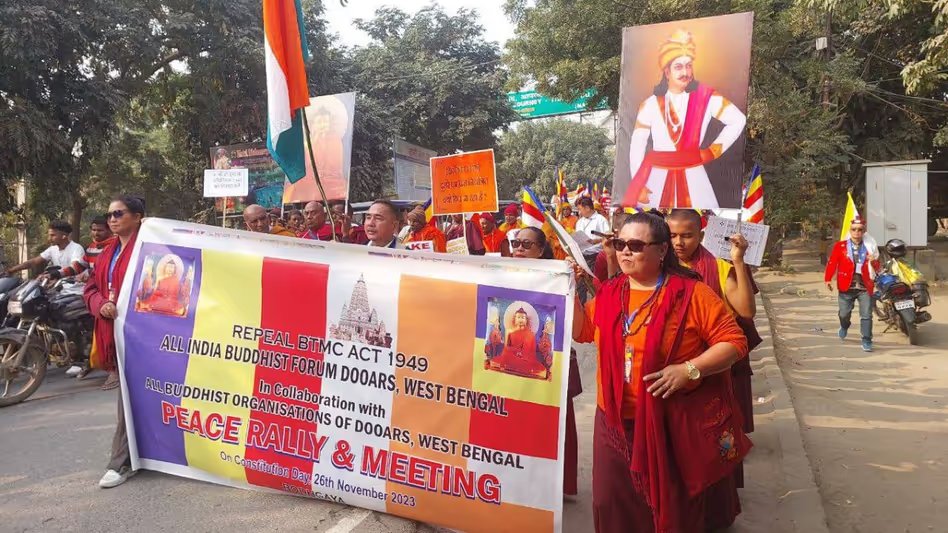In a peaceful demonstration of solidarity, the All Assam Buddhist Association, Tinsukia District Committee, organized a significant rally in Margherita, Assam, calling for amendments to the Buddha Gaya Temple Management Committee Act of 1949. The rally, which was attended by a large number of Buddhist followers from various parts of the region, aimed to draw attention to issues regarding the governance and management of the historic Bodh Gaya Temple, one of the holiest sites for Buddhists worldwide.
The Buddha Gaya Temple, located in Bihar, India, is considered the place where Lord Buddha attained enlightenment. It has great religious and cultural significance, and for centuries, it has been a pilgrimage site for Buddhists from all over the world. However, the management of the temple has long been a point of contention, particularly due to the administrative powers granted under the 1949 Act, which some Buddhist organizations believe does not adequately address the needs and aspirations of the global Buddhist community.
Buddhist groups, including those based in Assam, have expressed concerns that the current management structure does not reflect the diverse and dynamic needs of the Buddhist community. The Bodh Gaya Temple, being a major symbol of Buddhism, has often been seen as a place that should reflect the unity and aspirations of all Buddhists. As such, the demand for an amendment to the 1949 Act centers around creating a more inclusive and representative management committee, one that incorporates the voices of Buddhist monks, scholars, and local devotees.
During the rally, participants carried placards and chanted slogans calling for changes to the existing law that governs the administration of the Bodh Gaya Temple. The protestors expressed their belief that the current system does not allow for the active participation of local Buddhist communities and that it does not prioritize the interests of the people who hold the temple in the highest reverence. They called for a balanced approach to management, which would ensure that the temple’s administration would be more transparent and accountable to the people it serves.
The peaceful protest gained support from many within the region, as well as from Buddhist leaders who have been advocating for changes to the Act for years. According to the rally’s organizers, the call for amendment is not only a matter of governance but also an issue of preserving the cultural and religious identity of the Buddhist community. They emphasized that the Bodh Gaya Temple should be managed by those who have a deep understanding of Buddhist philosophy and a connection to the local and global Buddhist communities.
In response to the rally, Assam Chief Minister Himanta Biswa Sarma acknowledged the concerns raised by the protesters. He assured that the state government would lend its support to efforts aimed at ensuring a fair and transparent management system for the Bodh Gaya Temple. He also mentioned that the state would raise the matter with the central government to explore avenues for making necessary amendments to the law.
The rally in Margherita also attracted attention from various political leaders, some of whom expressed solidarity with the Buddhist community’s demands for reform. Local leaders pointed out that Assam, with its significant Buddhist population, plays a crucial role in the broader conversation about religious management and governance. As such, the peaceful protest served as a reminder of the growing political and social movements that are beginning to shape the future of religious administration in India.
The demand for an amendment to the Bodh Gaya Temple Management Committee Act of 1949 has gained momentum in recent years, with various Buddhist organizations from different parts of the country joining the cause. The rally in Margherita marked another important chapter in this ongoing movement, showing that the Buddhist community is determined to have their voices heard and their concerns addressed.
The peaceful demonstration was a reminder of the power of community-driven advocacy and the role of religious organizations in shaping policies that impact their communities. As the demand for amendments to the Act grows, it is expected that further discussions and negotiations will take place at both the state and national levels, in hopes of achieving a management structure that is more in tune with the needs of the Buddhist community worldwide.
In the coming months, the All Assam Buddhist Association and other groups involved in the movement will likely continue to hold rallies and engage in dialogues with policymakers. The goal is clear: a more inclusive, transparent, and accountable approach to managing one of Buddhism’s most revered sites.

